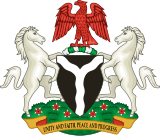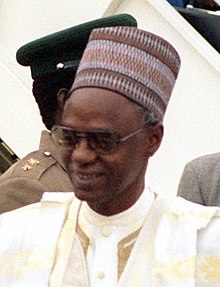Cabinet of Shehu Shagari
Cabinet of Shehu Shagari | |
|---|---|
 Cabinet of Nigeria | |
| Date formed | 1 October 1979 |
| Date dissolved | 31 December 1983 |
| People and organisations | |
| Head of state | Shehu Shagari |
| Head of government | Shehu Shagari |
| Member party | National Party of Nigeria (NPN) |
| History | |
| Predecessor | Government of General Olusegun Obasanjo |
| Successor | Government of General Muhammadu Buhari |

The Cabinet of Shehu Shagari formed the government of Nigeria during the presidency of Shehu Shagari between 1979 and 1983, after the return to civilian rule with the Second Nigerian Republic. Among the cabinet Ministers are Adamu Ciroma, Bello Maitama Yusuf, Mamman Ali Makele etc. It was terminated by a military coup.[1]
History
[edit]Lieutenant General Olusegun Obasanjo became head of the government after an attempted coup in February 1976. He managed the transition to civilian rule in an election won by the National Party of Nigeria led by Shehu Shagari.[2] Shagari took office on 1 October 1979.[3] He then appointed 61 ministers, of whom 24 were of cabinet rank. The ministers were both Muslim and Christian fairly distributed ethno religious sections of the country [2] Shagari made extensive use of the Cabinet Office, an organisation of leading professional civil servants, where it would have been more typical of a presidential system to rely more on political appointees.[4]
Shagari's government was accused of having immensely powerful ministers in his cabinet.[5] While he worked honestly, he didn't seem to have full grip of dishonest men working alongside him. Although, this view may be as result of the dictatorial military years preceding the second republic[6]
Shehu Shagari's National Party of Nigeria (NPN) won the 1983 general elections. The political parties resorted to violence, arson, vote rigging and other malpractices in the struggle for victory.[7] After the second election, Shagari removed all but seven of the former members of his cabinet, and appointed various respected technocrats such as Emeka Anyaoku in an effort to combat corruption within his cabinet. [6] shagari also introduced a new ministry under Maitama Sule in order to launch his ethical revolution program which had War Against Indiscipline as part of it.[8]
Soon after Shagari began his second term as president on 31 December 1983, the military staged a coup. It was led by Major Generals Muhammadu Buhari and Tunde Idiagbon.[2] The coup was launched two days after Shagari had announced an austerity program, forced due to a fall in the price of oil, which provided 90% of government revenue. Shagari and many cabinet members were arrested and detained without trial.[9]
Ministers
[edit]Cabinet members included:
| Office | Minister | Notes ' |
|---|---|---|
| President | Shehu Shagari | 1979–83 |
| Vice-president | Alex Ifeanyichukwu Ekwueme | 1979–83 |
| Agriculture | Ibrahim Gusau | December 1979 – February 1982[10] |
| Adamu Ciroma | February 1982 – October 1983[10] | |
| Attorney General and Justice | Richard Akinjide | December 1979 – October 1983[1] |
| Aviation | Samuel Mafuyai | December 1979 – February 1982[1] |
| John Kadiya | February 1982 – October 1983[1] | |
| Commerce | Isaac Shaahu | December 1979 – February 1982[1] |
| Bello Maitama Yusuf | February 1982 – October 1983[1] | |
| Communications | Akanbi Oniyangi | December 1979 – February 1982[10] |
| Audu Innocent Ogbeh | February 1982 – October 1983[1] | |
| Defence | Iya Abubakar | December 1979 – February 1982[10] |
| Akanbi Oniyangi | February 1982 – October 1983 [10][11] | |
| Education | I. C. Madubuike | December 1979 – February 1982[1] |
| Sylvester Ugoh | February 1982 – October 1983[1] | |
| Employment, Labor and Productivity | Adebisi Ogedengbe | December 1979 – February 1982[1] |
| Emmanuel Osanmor | February 1982 – October 1983[1] | |
| External Affairs | Ishaya Audu | December 1979 – October 1983[10][12] |
| Emeka Anyaoku | 1983 [12] | |
| Federal Capital Territory | John Kadiya | December 1979 – February 1982[1] |
| Abubakar Iro Danmusa | February 1982 – October 1983[1] | |
| Finance & Works | Sunday Essang | December 1979 – October 1983[1] |
| Health | D. C. Ugwu | December 1979 – October 1983[1] |
| Housing (and Environment from 1981) | Wahab Dosunmu | December 1979 – February 1982[1] |
| Ahmed Musa | February 1982 – October 1983[10] | |
| Industries | I. J. Igbani | December 1979 – October 1983[10] |
| Information | Garba Wushishi | February 1982 – October 1983[1] |
| Internal Affairs | Maitama Bello Yusuf | December 1979 – 1981 |
| Janet Akinrinade | (Minister of State) December 1979 – October 1983[1][13] | |
| Iya Abubakar | 1981–1982 | |
| Ali Baba | (Minister of State)1981 – 1982 | |
| Ali Baba | 1982 – 1983[14] | |
| Mines and Power | Mohammed Hassan | December 1979 – October 1983[1]
External Affairs II || October 1983 [1] - 31 December 1983 [1] |
| National Planning | Ebun Oyagbola | December 1979 – October 1983[1] |
| Police Affairs | Emmanuel Osanmor | December 1979 – February 1982[1] |
| Ndagi Mahmudu | February 1982 – October 1983[1] | |
| Public Works & Finance | Victor Masi | December 1979 – October 1983[10] |
| Science and Technology | Sylvester Ugoh | December 1979 – February 1982[1] |
| Wahab Dosunmu | February 1982 – October 1983[1] | |
| Social Welfare, Youth, Sports (to 1982) and Culture | Paulinus Amadike | December 1979 – February 1982[1] |
| Sports Development | Adebisi Ogedengbe | February 1982 – October 1983[1] |
| Steel Development | Paul Unongo | (MOS) December 1979 – February 1982[10] |
| Mamman Makele | February 1982 – October 1983[10] | |
| Transport | Umaru Dikko | December 1979 – October 1983[10] |
| Water Resources | Ndagi Mahmudu | December 1979 – February 1982[1] |
| E. Y. Atanu | February 1982 – October 1983[10] |
Notes
[edit]- ^ a b c d e f g h i j k l m n o p q r s t u v w x y z aa ab ac Ifeoha Azikiwe 2013, p. 279.
- ^ a b c Ajayi 2009, p. 152.
- ^ Falola & Heaton 2008, p. 201.
- ^ Inamete 2001, p. 111.
- ^ Ehling & Holste-von-Mutius 2001, p. 61.
- ^ a b Smith 2014, p. 183.
- ^ Ifeoha Azikiwe 2013, p. 271.
- ^ "Corruption in Nigeria: can it be ended in land of greased palms?". The Christian Science Monitor. 5 December 1983. Archived from the original on 13 November 2020. Retrieved 25 September 2020.
- ^ Dingle 1984, p. 21.
- ^ a b c d e f g h i j k l m Ifeoha Azikiwe 2013, p. 278.
- ^ Inamete 2001, p. 114.
- ^ a b Inamete 2001, p. 112.
- ^ Ronke Iyabowale Ako-Nai 2013, p. 163.
- ^ Abegunrin, Olayiwola (2003). Nigerian Foreign Policy Under Military Rule, 1966–1999. Greenwood Publishing Group, 2003. p. 103. ISBN 9780275978815. Retrieved 1 February 2016.
Sources
[edit]- Ajayi, Femi (2009). The Effect of Religion on the Political Process: The Case of the Federal Sharia Court of Appeal 1975–1990. iUniverse. ISBN 978-0-595-47828-6. Retrieved 3 July 2015.
- Dingle, Derek T. (April 1984). "A Takeover in Nigeria". Black Enterprise. Earl G. Graves, Ltd. ISSN 0006-4165.
- Ehling, Holger; Holste-von-Mutius, Claus-Peter (1 January 2001). No Condition Is Permanent: Nigerian Writing and the Struggle for Democracy. Rodopi. ISBN 90-420-1486-5. Retrieved 3 July 2015.
- Falola, Toyin; Heaton, Matthew M. (24 April 2008). A History of Nigeria. Cambridge University Press. ISBN 978-1-139-47203-6. Retrieved 3 July 2015.
- Ifeoha Azikiwe (2013). Nigeria: Echoes of a Century: Volume One 1914–1999. AuthorHouse. ISBN 978-1-4817-2926-0. Retrieved 3 July 2015.
- Inamete, Ufot Bassey (1 January 2001). Foreign Policy Decision-making in Nigeria. Susquehanna University Press. ISBN 978-1-57591-048-2. Retrieved 3 July 2015.
- Ronke Iyabowale Ako-Nai (2013). Gender and Power Relations in Nigeria. Rowman & Littlefield. ISBN 978-0-7391-7778-5. Retrieved 3 July 2015.
- Smith, Graham (25 September 2014). Federalism: The Multiethnic Challenge. Taylor & Francis. ISBN 978-1-317-89308-0. Retrieved 3 July 2015.
